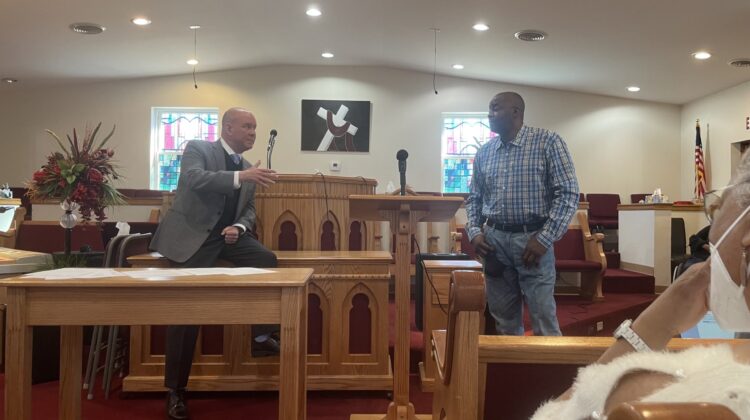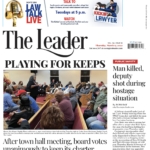
Late last week Chancellor Anne C. Martin denied the Town of Mason’s request for an injunction against the comptroller’s corrective action plan.
The emergency petition filed on April 1 by the NAACP on behalf of the town alleged the comptroller’s office acted outside of its authority in taking control of the town’s finances last month, violated state law, violated the Equal Protection Clause and the state constitution, and acted in a racially discriminatory manner because the town’s finances were not taken over when its elected officials were predominantly white.
The charges of racial discrimination, said the comptroller’s office, were not true.
In the response, the office said, “The Town’s baseless allegations that any act by the Comptroller has been motivated by the demographics of the Town’s government officials are inflammatory and merely distract from the Comptroller’s statutory purpose.”
Mason’s elected officials have said though the comptroller’s office oversaw finances in Van Buren County and in the Jellico, however despite two decades of financial concerns the comptroller’s office only took action when an economic boom was the horizon and only when the predominantly African-American town had predominantly African-American leadership.
The financial issues
The majority of Mason’s financial missteps took place during the time when it had white leaders, though there have been people of color on the board in every administration during the last two decades. Mason’s mayor and vice mayor have been part of the board since 2014 and 2016.
During its legal proceedings the Town of Mason did not deny its debt. An investigation conducted by the Tennessee Comptroller of the Treasury Water & Wastewater Financing Board showed the Mason General Fund owed the Water and Sewer Fund $17,468 after its 2011 audit was filed in 2012.
The number fluctuated from as high as $76,117 the following audit year to $31,764 by the FY 2015 audit, which was submitted in 2017 during the Gwendolyn Kilpatrick administration. The deficit grew to $104,261 at the end of FY 2016 (audit submitted in 2019), $112,068 at the end of FY 2017 (audmit submitted in 2020), $355,867 at the end of FY 2018 (audit submitted in 2020), and $608,047 at the end of FY 2019 (audit submitted in 2021).
Emmitt Gooden became the mayor in December 2018, midway through FY 2019.
The town estimated as of June 30, 2021, the general fund and the gas fund collectively owed the water and sewer fund $598,019.
Corrective action plans were agreed to three different times during this 10-year period, however the money owed has never been completely repaid.
Comptroller: The closure of the prison, not Ford, prompted the comptroller’s decision
The February visit by the state comptroller seemed to come out of nowhere, and Mason’s elected officials have suggested so as well.
They have suggested the comptroller’s office had only decided to step in after the Blue Oval City announcement had been made in late September 2021.
The comptroller’s office gives a different timeline and said another economic impact was the impetus for its drastic decision. The town’s late audits didn’t give the comptroller’s office an accurate picture of the town’s finances in real-time, however they were aware the town’s general fund was illegally being supplemented through fund transfers from the water and sewer fund.
When the prison, which was the town’s largest utility consumer, closed, the comptroller’s office decided to step in, court documents show.
Several documents allege town leaders, at several points, assured the comptroller’s office the debt to the utility funds had been repaid. That was not the case, the comptroller’s office said, and the debt had actually increased. This caused concern and a plan of action for the comptroller – if the town’s largest customer left, could they still repay their debt?
The state has not approved Mason’s budgets in years due to it’s financial issues and consistently late audits.
Mason’s issue with the corrective action plan
The corrective action plan, which went into effect on April 4, limits spending by Mason’s elected officials.
In affidavits filed with the suit, mayor Emmit Gooden, vice mayor Virginia Rivers, and financial officer Reva Marshall said the $100 limit restricts the town from operating as it should be able to. For instance, diesel trucks and fire trucks cannot be filled with fuel without approval from officials in Nashville and would require Marshall to be on call at all hours of the day to communicate with the comptroller’s office in an emergency.
“… The plan remains unduly burdensome, strips elected officials from their ability to operate, and lacks a definitive end point,” the NAACP said.
Several other corrective action plans have been agreed to with Mason not living up to its end of the agreement.
Authority and Equal Protection
A key point in the case was the suggestion that the comptroller’s office was abusing its authority when the decision was made earlier this year to more closely oversee the town’s spending after years of financial mismanagement.
There was not a case made against the statute itself and Chancellor Martin said the allegations raise serious concerns about the comptroller’s equitable exercise of his broad authority.
A precedent has also already been set wherein a municipality, called a political subdivision, cannot sue its state.
Further, Martin acknowledged the “harsh realities” of the financial issues caused predominantly by previous administrations but said the court may also “take into account the state’s interest in moving the town towards financial stability and a balanced budget.” The court also found the alleged harm to the town is “slightly outweighed by the harm the injunction will inflict on the state in implementing balanced budgets and assisting municipalities in financial distress in light of the broad authority imposed by statute, although the court notes that this must not be done in a discriminatory manner.”
The Town of Mason’s Board of Mayor and Aldermen meets again Monday night. Its finance committee met after press time Wednesday night.






Leave a Reply